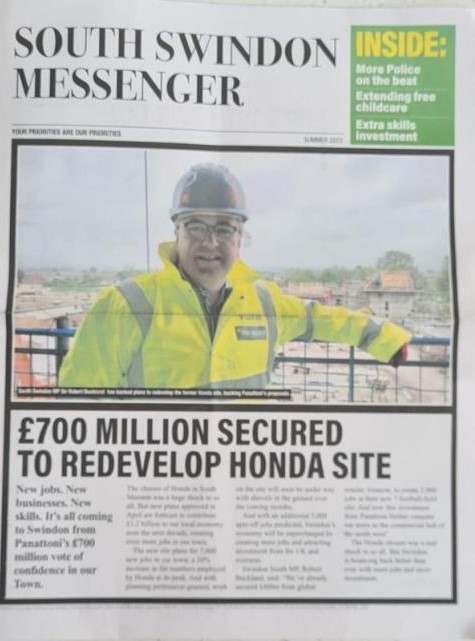A Tory MP has defended his use of fake local newspapers – saying he is “glad people are talking about it”.
South Swindon MP Sir Robert Buckland has claimed local press mimicry is “a positive thing” after delivering a title called the South Swindon Messenger around his constituency.
Dozens of Tory MPs began delivering such pamphlets in recent days, with the names of two real former local newspapers – the Lincoln Chronicle and the High Peak Reporter – being among those used to head up the pamphlets.
The Electoral Commission has said it is “powerless” to act on the practice, while the UK Government told HTFP last week fake local newspapers “should not be regulated” after refusing to act to stop it.

Speaking to Swindon Advertiser reporter Daniel Wood, who previously called out Sir Robert’s use of the tactic, the former Justice Secretary said: “I’m glad people are talking about it and the positive messages are getting out there about what I’m doing.
“This isn’t a new thing, all of the parties have done something similar so I don’t see what the issue is.
“It’s just another way to promote all the things I’m doing, I’ve been campaigning for 20 years and have used all sorts of things in that time – leaflets, newspapers, surveys.
“The way I campaign is positive, and it’s a positive thing to be supporting the Conservatives.”
A poll for Byline Times by independent pollsters Omnisis has also revealed 62pc of voters think the practice should be banned if they do not make clear which party is behind it.
The figure rises to 65pc among Conservative voters, the same as for Labour voters, while 55pc of Liberal Democrat voters agree with a ban.
HTFP has repeatedly highlighted different parties’ use of the tactic in recent years, while the issue prompted Newsquest editorial director Toby Granville to threaten not to publish Liberal Democrat election campaign news ahead of the 2019 General Election.
The Commission subsequently revealed the practice was among the major concerns of the public in its report into campaigning ahead of the election and called for “real change” on the issue.





 Follow HTFP on Twitter
Follow HTFP on Twitter